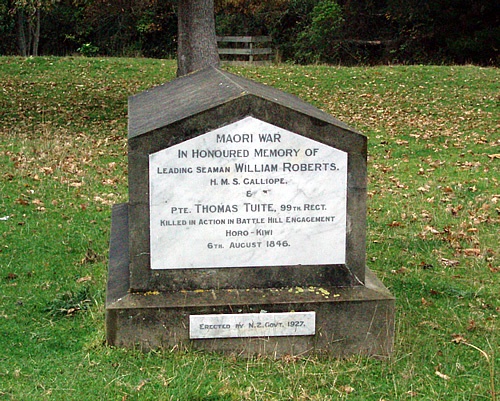
Battle Hill Farm Forest Park, nearly 40 km north-east of Wellington, is reached via Paekākāriki Hill Road, which runs up the Horokiri (or Horokiwi) Valley from Pāuatahanui. Within the park, to the east of the Horokiri stream, a steep razorback ridge lies below the summit of what is now known as Battle Hill.
On 6 August 1846, this ridge was the scene of a battle between about 400 imperial, colonial and kūpapa (Māori fighting alongside the government) forces, and several hundred Ngāti Toa led by Te Rangihaeata. This tombstone marks the grave of two British men who were killed in action on Battle Hill.
Troops under Major Edward Last began climbing Battle Hill at about 9 a.m. on 6 August. In miserable conditions they struggled up through the wet, heavy bush that covered the steep hillside, following a party of soldiers who felled trees as they went. Nearing Te Rangihaeata’s position, the main body of troops halted less than 100 m below the crest of the ridge while a party of about 20 men advanced to within 50 m of the enemy’s position.
Three of the advance party were killed. One was Private Thomas Tuite of the 99th Regiment, a former labourer from Dublin. Another – Leading Seaman William Roberts, captain of the mizzen-top on HMS Calliope – was mortally wounded.
Roberts and Tuite were buried together near the battlefield. This concrete tombstone covers their grave on the campsite at the foot of Battle Hill to which the force returned at nightfall. The headstone was erected by the New Zealand government in 1927.
(Roberts is also commemorated on a memorial that stands today in Bolton Street Memorial Park in central Wellington. The memorial, erected by ‘their surviving shipmates as a token of their respect’, commemorates six marines and sailors of HMS Calliope who died in 1846 and 1847.)
The third man killed was acting Ensign Henry Middleton Blackburn of the 99th Regiment. One of the officers leading the advance party, he was shot by a Ngāti Toa sniper concealed in a tree.
It was initially intended to bury Blackburn at ‘Camp Paramatta’ (on the site of the Paremata Barracks, now in Ngatitoa Domain, Porirua City). Instead his body was conveyed to Wellington on HMS Castor and interred with military honours in the presence of Governor George Grey on 14 August. Today Blackburn’s grave can be found in Bolton Street Memorial Park in central Wellington.
Additonal image
Inscriptions
Horokiri Valley grave
Maori War / In Honoured Memory of / Leading Seaman William Roberts. / H. M. S. Calliope. / & / Pte. Thomas Tuite, 99th Regt. / Killed in action in Battle Hill Engagement / Horo-Kiwi / 6th August 1846. / Erected by N.Z.Govt. 1927.
Bolton Street Cemetery grave
Sacred / to the / memory of / Henry Middelton / Blackburn Esqr. / Ensign in H.M. 99th Regt. / who was killed in action / in the Valley / Horokiwi / August the 6th / 1846 / Aged 22 years
Further information
- ‘New Zealand Spectator, and Cook’s Strait Guardian. Saturday, August 8, 1846’
- ‘New Zealand Spectator, and Cook’s Strait Guardian. Saturday, August 15, 1846’
- ‘Despatches Detailing the Recent Military Operations in the Southern District’, New Zealand Spectator and Cook’s Strait Guardian, 19 August 1846
- Angela Ballara, ‘Te Rangihaeata - Biography’, Dictionary of New Zealand Biography, Te Ara - the Encyclopedia of New Zealand, updated 1 September 2010
- James Cowan, ‘Paua-taha-nui and Horokiri’, in The New Zealand Wars: a history of the Maori campaigns and the pioneering period: volume I: 1845–1864, R.E. Owen, Wellington, 1955, pp. 123–34
- Friends of Bolton Street Memorial Park, Friends of Bolton Street Memorial Park
- H.F. McKillop, Reminiscences of twelve months’ service in New Zealand, as a midhsipman, during the late disturbances in that colony, Richard Bentley, London, 1849 (reprints by Capper Press, Christchurch, 1973; Kiwi Publishers, Christchurch, 1998)
- Nigel Prickett, ‘Wellington, 1846’, in Landscapes of conflict: a field guide to the New Zealand Wars, Random House, Auckland, 2002, pp. xi, 48–53
- Chris Pugsley, ‘Walking the Wellington Wars: Skirmishes at Porirua and Battle Hill, August 1846’, New Zealand Defence Quarterly, no. 7 (Summer 1994), pp. 36–41


Community contributions